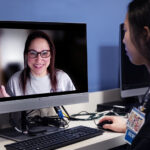EarlyBird: Addressing dyslexia through game play

Up to 10 percent of the population has dyslexia, yet many children are diagnosed only after struggling with reading for years. The stigma can cause low self-esteem, depression, and antisocial behavior.
But imagine we could identify children at risk for dyslexia before they start formal reading instruction, then help them build the skills they need in a fun game format. That’s the vision of EarlyBird, a product that grew from research at Boston Children’s Hospital and was incubated in the hospital’s Innovation & Digital Health Accelerator (IDHA).
“We’re driven by this strong mission to change a trajectory that is completely broken now,” says Carla Small, EarlyBird’s co-founder and CEO.
About the Accelerator Program at Boston Children’s
IDHA’s Accelerator Program builds or accelerates new digital health solutions that leverage Boston Children’s expertise to make an impact beyond the hospital’s walls. The team works with clinical and subject matter experts across the hospital to identify promising opportunities and provides strategic and technical resources to develop and commercialize novel solutions. To date, IDHA has successfully spun out six companies.
EarlyBird is personal for Small, who left IDHA to lead EarlyBird in 2020. Her own son’s dyslexia went undiagnosed until he was 8. “He could watch a science show and tell you all about some deep scientific concept, yet at school, he could not grasp the alphabet, couldn’t learn to read,” she says. “I had to find the right resources, pay for neuropsychiatric testing, and advocate for him in school. Many families might not have the wherewithal to do this.”
John Brownstein, PhD, chief innovation officer at Boston Children’s, agrees. “By incubating a solution within IDHA, we’ve been able to transform our research into a practical tool that’s making an impact in early childhood literacy,” he says.
Building a dyslexia diagnostic
In the 2010s, researchers led by Boston Children’s cognitive neuroscientist Nadine Gaab, PhD, (now at the Harvard Graduate School of Education) showed that having children as young as 4 perform a set of specialized language tasks could predict their risk for dyslexia. The tasks call on children to recognize and manipulate parts of spoken words like syllables and consonant and vowel sounds — backbone skills needed for reading.
Based on the research, Gaab created and validated a tool for identifying dyslexia risk before children start formal schooling. IDHA then worked with experts in early childhood gaming to make the tool fun, supported by donations from family foundations.
“We were looking to match areas of unmet need in the digital health market with innovation and expertise at Boston Children’s,” says Annie Hill, who directs IDHA’s Accelerator. “This project had the perfect combination.”
The IDHA team held a two-day event that convened experts from Boston Children’s and beyond, including people from the education and business sectors. “People were impressed that we had an accelerator that was spinning out a thoughtful, successful business,” Small says.
EarlyBird became a company in 2019; Boston Children’s has an equity stake. With its initial round of funding, EarlyBird conducted a three-year study to validate the games in 40 schools across the country. “We then enhanced it to make it market-ready, with a dashboard targeted to teachers’ needs,” says Small.
Breaking down language tasks

In the games, children join a friendly bird named Pip on a journey through the city, where they meet animal friends and complete tasks. Tasks might include picking the sound associated with a letter, or selecting the picture associated with a word.
“We believe in intrinsic motivation,” says Small. “Kids naturally like to learn — they feel good, because they’re making progress. The games aren’t overdone with rewards and fanfare.”
Children’s scores on the games help teachers identify those at risk for dyslexia or other reading problems and which reading skills they’re struggling with most. The core skills are awareness that words are made of sounds that can be added or removed to make new words; oral language comprehension; the ability to identify letters and match corresponding letter sounds; and the ability to quickly name colors, letters, or objects. The dashboard suggests evidence-based interventions to address areas of weakness, rewire young children’s brains, and increase their reading success.
To date, teachers have screened almost 100,000 children in 25 states using EarlyBird. In an internal survey, 75 percent said they identified a child at risk for dyslexia who might have otherwise slipped through the cracks. EarlyBird also offers a data workshop to help teachers understand their students’ scores and connects teachers with resources and classroom activities.
EarlyBird at home

In the past year, EarlyBird has expanded its offerings to parents directly.” Parents of children ages 4 to 9 can subscribe to a consumer version of EarlyBird to help their children grow the building-block skills used in reading. The subscription includes assessments, progress reports, and periodic one-on-one meetings with literacy specialists.
EarlyBird has won several educational awards. The company continues to tweak the games based on new research and input from parents and educators.
“We’re seeing a lot of interest among pediatricians,” says Small. “They often don’t have many resources to offer families whose kids are struggling with reading. They usually will give a referral for a neuropsychiatric evaluation, but there is a long wait for these evaluations and they can cost thousands of dollars out of pocket. We’re thrilled to be able to help these families.”
Disclosure: Nadine Gaab, PhD, is a co-founder and scientific advisor at EarlyBird. Gaab, Brownstein, and Boston Children’s Hospital each have an equity stake in EarlyBird.
Related Posts :
-

How will the winter darkness affect kids' learning and sleep this year?
The recent fall back of the clocks marked the official end of daylight saving time (DST). It also marks the ...
-

BabySee: Mobile app lets you see through an infant’s eyes
David Hunter, MD, PhD, chief of Ophthalmology at Boston Children’s Hospital, gets a lot of questions from parents, but ...
-

Nurse-led innovations: A virtual-nursing pilot helps nurses thrive
It was night shift on the 9E Inpatient Medical Unit and Marisol Hernandez, BSN, RN, CPN, was helping another nurse ...
-

Step by step: What to consider before your child wears a fitness tracker
Energetic children run circles around their parents. Wearable devices can count how many footsteps go into those circles. Depending ...




